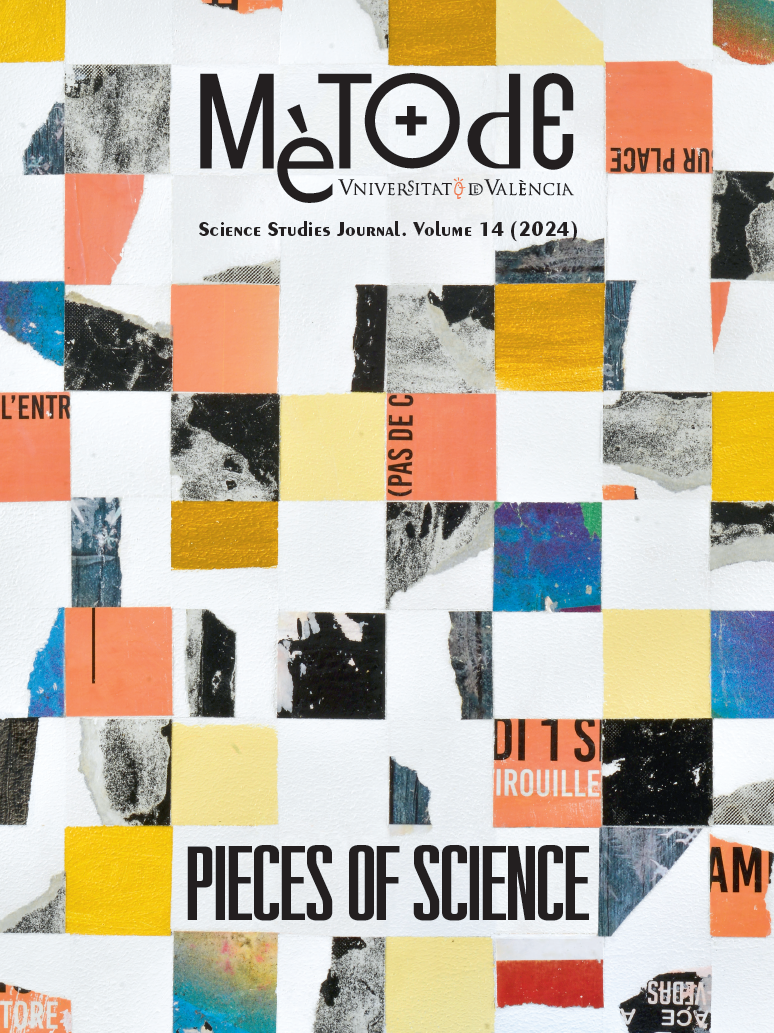A religious past to science: How Biblical stories have contributed to the construction of scientific knowledge
DOI:
https://doi.org/10.7203/metode.14.26559Keywords:
Bible, Creation, Noah’s Flood, fossils, Darwin’s theory of evolution Abstract
Abstract
Stories captivate us by speaking to our imagination and by giving order and meaning to our world. Stories not only give us knowledge about society, but they can also shape our understanding of nature. In the Western world, Christianity has provided narratives that were used as references in scientific research for centuries. In this article I discuss two such examples, the Creation story and the story of Noah and the Great Flood, and explain their prevalence in scientific endeavors conducted in the West. These stories were only replaced by alternative ones when new scientific theories and concepts were given sufficient coherence to explain new discoveries.
 Downloads
Downloads
 References
References
Bowler, P. J. (2009). Evolution: The history of an idea. The University of California Press.
Dibattista, L., & Morgese, F. (2014). Incorporation of HPS/NOS Content in School and Teacher Education Programmes in Europe. In M. Matthews (Ed.), International handbook of research in history, philosophy, and science teaching. Volume 3 (pp. 2083–2111). Springer.
Farber, P. L. (2000). Finding order in nature: The naturalist tradition from Linnaeus to E. O. Wilson. The Johns Hopkins University Press.
Gamito-Marques, D. (2020). In praise of a historical storytelling approach in science education. Isis, 111, 582–587. https://doi.org/10.1086/711126
Graham, D. W. (2018). Physical and cosmological thought before Aristotle. In A. Jones & L. Taub (Eds.), Cambridge history of science. Volume 1: Ancient science (pp. 163–180). Cambridge University Press.
Houghton, H. A. G. (2023). Introduction. In H. A. G. Houghton (Ed.), The Oxford handbook of the Latin Bible (pp. xxv–xxxvii). Oxford University Press.
Livingstone, D. N. (2014). Dealing with Darwin: Place, politics and rhetoric in religious engagements with evolution. Johns Hopkins University Press.
Meretoja, H. (2018). The ethics of storytelling: Narrative hermeneutics, history, and the possible. Oxford University Press.
Numbers, R. L., & Stenhouse, J. (Eds.). (2001). Disseminating Darwinism: The role of place, race, religion, and gender. Cambridge University Press.
Rudwick, M. J. S. (2014). Earth’s deep history: How it was discovered and why it matters. The University of Chicago Press.
Stiling, R. L. (2000). The Genesis Flood. In G. B. Ferngren (Ed.), The history of science and religion in the Western tradition: An encyclopedia (pp. 453–457). Garland Publishing.
Weldon, S. P. (2017). Science and religion. In G. B. Ferngren (Ed.), Science and religion: A historical introduction (pp. 3–22). Johns Hopkins University Press.
Downloads
Published
How to Cite
-
Abstract596
-
(Español)4
-
PDF218
Issue
Section
License
Copyright (c) 2023 CC BY-NC-ND 4.0

This work is licensed under a Creative Commons Attribution-NonCommercial-NoDerivatives 4.0 International License.
![]()
All the documents in the OJS platform are open access and property of their respective authors.
Authors publishing in the journal agree to the following terms:
- Authors keep the rights and guarantee Metode Science Studies Journal the right to be the first publication of the document, licensed under a Creative Commons Attribution-NonCommercial-NoDerivatives 4.0 International License that allows others to share the work with an acknowledgement of authorship and publication in the journal.
- Authors are allowed and encouraged to spread their work through electronic means using personal or institutional websites (institutional open archives, personal websites or professional and academic networks profiles) once the text has been published.





